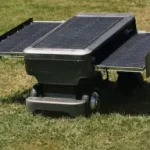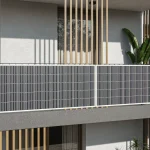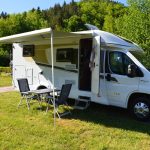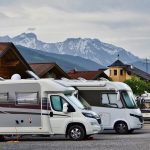RV travel offers a unique blend of adventure and comfort, allowing you to explore distant landscapes while enjoying the conveniences of home. As RV culture continues to thrive, many enthusiasts are turning to solar power to enhance their experience, reducing reliance on fossil fuels and embracing sustainable energy solutions. While some RV dealers provide solar panel installation services, many RV owners prefer the challenge and satisfaction of setting up their own solar systems. A crucial component of any solar system is the inverter. This article aims to guide RV owners who are new to solar energy on how to choose the right inverter for their RV solar systems.
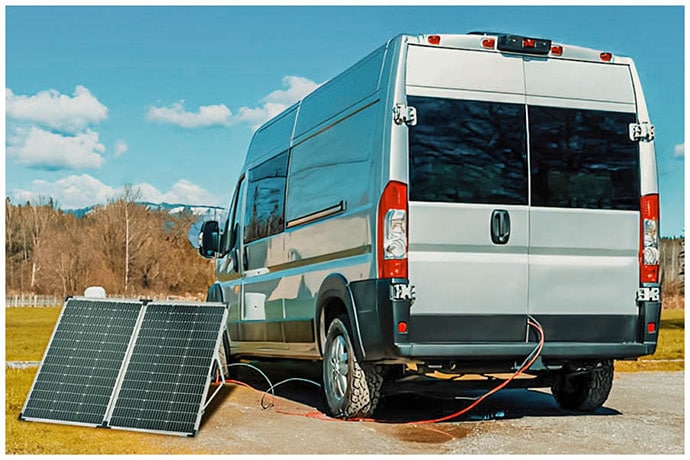
Understanding the Role of an Inverter
Before diving into the selection process, it’s important to understand what an inverter does. In a solar power system, solar panels generate direct current (DC) electricity. However, most household appliances run on alternating current (AC). An inverter’s primary function is to convert the DC electricity produced by your solar panels into AC electricity, making it compatible with your RV’s appliances.
Core Indicator of Inverters: Power
When choosing an inverter, the most crucial factor to consider is its power rating. The power rating indicates the maximum load the inverter can handle. To determine the appropriate power rating for your RV inverter, you need to assess your power needs. Here’s how to do it:
- List All Electrical Appliances: Start by listing all the electrical appliances you plan to use in your RV. Common items include refrigerators, microwaves, lights, laptops, air conditioners, and charging devices.
- Check Power Ratings: Each appliance has a label indicating its power consumption, usually in watts (W). Note down the power rating of each appliance.
- Calculate Total Power Requirement: Add up the power ratings of all your appliances to get the total power requirement. This is the baseline power your inverter needs to handle.
- Add a Safety Margin: For safety and efficiency, your inverter’s power rating should be about 20% higher than your total power requirement. This accounts for any additional appliances you might add in the future and ensures the inverter operates smoothly without overloading.
The formula to determine the inverter power is:
Total Appliance Power × 1.2 = Inverter Power
For example, if the total power consumption of your appliances is 1000W, then the inverter power should be:
1000W × 1.2 = 1200W
Types of Inverters
There are several types of inverters available, each with its own advantages and applications. Understanding these types can help you make an informed decision:
- Pure Sine Wave Inverters: These inverters produce a smooth, consistent wave of electricity similar to what you get from the grid. They are ideal for sensitive electronics and appliances that require a stable power supply, such as laptops, televisions, and medical equipment. Although more expensive, pure sine wave inverters offer the best performance and are recommended for RVs.
- Modified Sine Wave Inverters: These are more affordable and produce a wave that approximates a sine wave. While suitable for most standard appliances, they may cause issues with sensitive electronics, leading to inefficiency or potential damage over time.
- Square Wave Inverters: The least expensive and least efficient option, square wave inverters are rarely used in modern RV applications due to their limited compatibility with most appliances.
Additional Features to Consider
While power rating and inverter type are the primary considerations, there are additional features that can enhance the functionality and convenience of your RV solar system:
- Efficiency: Look for inverters with high efficiency ratings to ensure maximum power conversion with minimal energy loss.
- Surge Capacity: Some appliances, like refrigerators and air conditioners, require a higher initial surge of power to start. Ensure your inverter has sufficient surge capacity to handle these peaks without tripping or overloading.
- Remote Monitoring and Control: Some modern inverters come with remote monitoring capabilities, allowing you to check system performance and make adjustments from your smartphone or tablet.
- Portability: If you plan to use the inverter in different settings or transfer it between vehicles, consider a portable model that’s easy to install and remove.
- Warranty and Support: Choose inverters from reputable manufacturers that offer solid warranties and customer support. This can save you time and hassle if any issues arise.
Installation Tips
Installing an inverter in your RV can be straightforward if you follow these basic steps:
- Choose a Suitable Location: Inverters should be installed in a dry, well-ventilated area to prevent overheating. Ensure the location is easily accessible for maintenance and monitoring.
- Secure Mounting: Use appropriate mounting brackets or hardware to secure the inverter in place. This prevents movement or damage during travel.
- Proper Wiring: Follow the manufacturer’s instructions for wiring the inverter to your RV’s electrical system. Use high-quality cables and connectors to ensure a safe and efficient connection.
- Fuse Protection: Install fuses or circuit breakers between the inverter and the battery bank to protect against overcurrent and short circuits.
- Test the System: Once installed, test the inverter with various appliances to ensure it operates smoothly and meets your power needs.
Conclusion
Choosing the right inverter for your RV solar system is essential for a seamless and enjoyable off-grid experience. By understanding your power requirements, selecting the appropriate inverter type, and considering additional features, you can ensure your RV is equipped with a reliable and efficient power source. Whether you’re a seasoned RV enthusiast or a newcomer to solar energy, this guide provides the knowledge and confidence to make an informed decision, enhancing your RV adventures with sustainable and dependable power.


